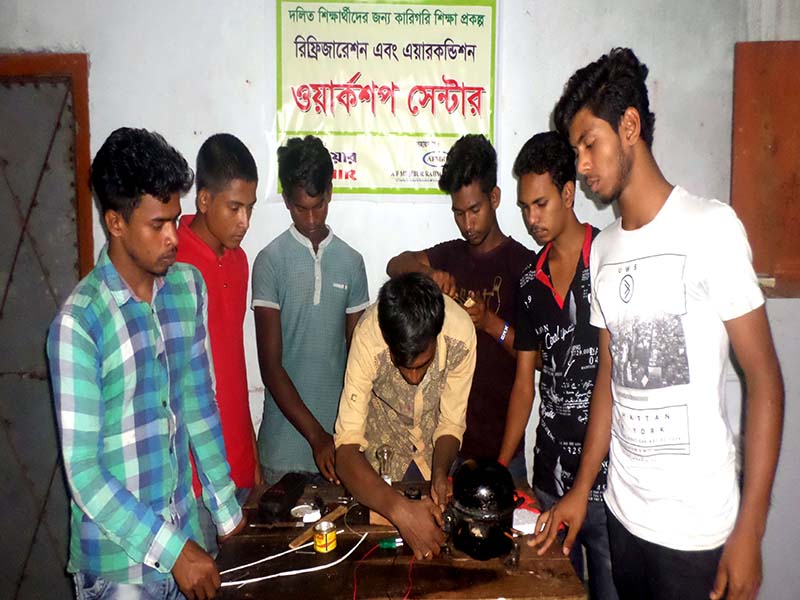
Vocational Education for Dalit Student
Project Summary
The proposed project focuses on creating modern technical knowledge based generation among the marginalised and excluded people. In the first phase of project operation (October 2018 to September 2019) 110 marginalised trainees have been trained and educated on 5 employment/job focused trades leading to huge self-employment opportunities for all. This successful completion of the project has created an example of sustainable professional diversity and alternative choices for the marginalised community who have long been confined in their traditional job. In the (January-December, 2020) tenure, 2nd phase, which is based on experiences and learning of the 1st phase, aims to graduate/educate more 172 marginalised and excluded students through vocational and technical based education.
Rationale of the project
The Dalit community is the most marginalised and socially excluded group in Bangladesh. Different research indicated that about 5.5 million people have been estimated to belong to Dalit communities in Bangladesh. According to the survey of Social Services Department, about 4.4 million Dalit’s and about 1.3 million Harijon’s of total population in 63 district in Bangladesh and engaged in socio-economic development of the country. In terms of socio-economic condition, Dalit’s are involved in professions which are considered low, impure and filthy – such as sweeping, sewerage cleaning, pig rearing, burning dead bodies, shoe and leather worker, fisher-folk, drum beating etc.
FAIR’s working experience reveals that people treat these communities’ as untouchables; they constantly experience hatred, disgrace, torture, discrimination, humiliation, social disparity and deprivation. They are treated as outcasts of the society and have no access to public places including restaurants, salons, schools, hospitals. FAIR’s working experience also reveals that the number of Dalit students is gradually increasing in this community because of their growing awareness about education and its importance. But due to unfavorable policies of the government, bureaucratic hassles, non-cooperation of concerned authorities, social barrier and detachment, lack of modern technological skill and knowledge, educated Dalit youths can’t enter the competitive job market. Those causes are also creating more problems as the communities are gradually losing their traditional jobs leading to the increasing suffering of this vulnerable group.
As a developing country, Bangladesh has tremendous opportunities of economic development by creating its huge population as skilled human resources for internal and international labor market. Vocational and technical education in Bangladesh can play important role in the development of our national economy through the creation and supply of mid-level skilled manpower according to the present growing demands of the national and global labour market. Young generation including Dalit in Bangladesh is very much enthusiastic and interested in this sector as the future of their career. But Dalit communities are still facing the same fate even in this sector.
This action will ensure their rights and dignity in the society, reduce discrimination and vulnerability when vocational and technical based skilled human resources in the community will gradually increase.
About vocational and technical based education and course:
The proposed project will impart 360 hours/6 Months long vocational and technical based education certification course under the curriculum of Bangladesh Technical Education Board. The name of the courses has been stated below:
- Computer Applications;
- General Electrical works and Machine maintenance;
- Mobile Servicing;
- Refrigeration & Air Conditioning servicing; and
- Plumbing Service.
Overall Goal of the Project:
Educating marginalised and excluded people through vocational and technical based education.
Overall Objective of the Project:
- To create vocational and technical based education opportunity for the students from the marginalized and deprived sections of society.
- To ensure skill development of marginalized and excluded student and create employment opportunities for them.
Strategy of the Project:
- A computer lab will be set up.
- To circulate and select student for vocational and technical based
- To conduct 360 hours/6 monthly vocational and technical based
- A series of counseling and mentoring supports program including group and individual discussions will be organized for the student.
- A database of the student will be created on their female information, livelihood, area of interest, education, jobs, and future aspirations etc.
Achievements:
- Yearly 110 Marginalised and excluded people improved their skill through vocational and technical based education.
- 90% of trained student are self-employed.
- Yearly 110 Marginalised and excluded people improved rights and dignity through vocational and technical education.
- A computer lab established and computer based education provided among marginalised and excluded and others people.
